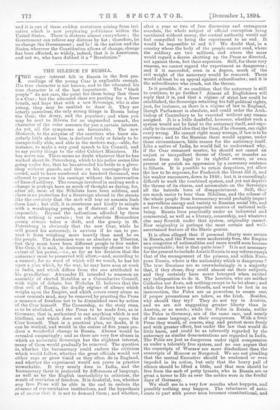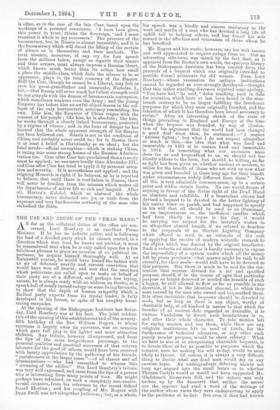THE SILENCE IN RUSSIA.
THE eager interest felt in Russia in the first pro- ceedings of the young Czar is explicable enough, His true character is not known, and to the educated his true character is of the last importance. The " black people " do not care, the point for them being that there is a Czar ; but the educated class are panting for a. freer breath, and hope that with a new Sovereign, who is also young, they may be enabled to draw it. They are utterly powerless, the only strong things in Russia being the Czar, the Army, and the populace; and when you may be sent to Siberia for an unguarded remark, the character of the ruler assumes for you a certain interest. As yet, all the symptoms are favourable. The new Monarch, to the surprise of the courtiers who knew sin- gularly little about him, is declared truly or falsely to be unexpectedly able, and able in the modern way,—able, for instance, to make a very good speech to his Council, and to say pretty things to the older Cabinet Ministers. He has nerve too, There seems no doubt whatever that he has walked about St. Petersburg, which to his police seems like going under fire, that he has attended his bride to a glove- shop without guards, and that on his marriage-day the ecrowd, said to have numbered six hundred thousand, was ,allowed to press on his carriage without the intervention -of lines of soldiery. The courage involved in making such a . change is perhaps born as much of thought, as daring, for, after all, inost, of the Nihilists have been soldiers, and there is no protection for a, Sovereign abroad in the streets like the certainty that the mob will tear an assassin limb from limb ; but still, it is courteous and kindly to mingle with a worshipping people, as if distrust of them was impossible. Beyond the indications afforded by these facts nothing is certain ; but in absolute Monarchies lsoasip always takes a drift, and the gossip in St. Petersburg i3 obviously that the new Czar, while he w ill guard his autocracy, is anxious if he can to pre- vent it from weighing more heavily than need be on his people. The Antonines were as absolute as Tiberius, -but they must have been different people to live under. The Czar, it is said, is desirous to remedy abuses to the e xtent of his power,—i.e., so far as his decision that the autocracy must be preserved will allow,—and, according to a rumour, for no word of which will we vouch, he has hit upon a plan which, by the way, he may have seen at work in India, and which differs from the one attributed to Lis grandfather. Alexander IL intended to summon an assembly of elected Notables as a Consultative Council, with right of debate, but Nicholas IL believes that the (first evil of Russia, the deadly regime of silence which weighs upon the Empire, and which covers every abuse as now conceals mud, may be removed by granting the Press a measure of freedom not to be diminished save by action of the Czar himself, The Censorship, so the story runs, is to be abolished, and the Press to be made free, as in Crermany, that is, authorised to say anything which is not libellous, and which does not reflect directly upon the 'Czar himself. That is a practical plan, no doubt, if it can be worked, and would in the course of five years pro- .duce a wonderful change in Russia,. Abuses would be revealed unsparingly ; and as there are very few abuses in which an autocratic Sovereign has the slightest interest, ,many of them would gradually be removed. The question Cis, whether the bureaucracy could endure the criticism "which would follow, whether the great officials would not either rage or grow timid as they often do in England, and whether the experiment would not prove in practice unworkable. It very nearly does in India, and the bureaucracy there is protected by differences of language, as well as by the English insensibility to criticism, the result of centuries of freedom. It is doubtful, too, whether any free Press will be able in the end to endure the abaence of representative institutions, and the hypothesis is of course that it is not to demand them ; and whether, after a year or two of free discussion and outrageous scandals, the whole subject of official corruption being ventilated without mercy, the central authority would not feel compelled to bring the experiment to an end. It would be impossible to end it ? We doubt that, in a country where the body of the people cannot read, where the soldiery are two millions, and where the mass would regard a decree shutting up the Press as directed, not against them, but their superiors. Still, for these very reasons, we cannot regard the experiment as dangerous ; and if it succeeded, even in a degree, much of the evil weight of the autocracy would be removed. There would at least be an appeal against subordinates; and it is the subordinates who crush, not the throne.
Is it possible, if we condition that the autocracy is still to continue, to go further ? Almost all Englishmen will reply that it is, and that a regime of strict law could be established, the Sovereign retaining his full political rights, just, for instance, as there is a regime of law in England, though Parliament is absolute, and could order the Arch- bishop of Canterbury to be executed without any reason assigned. It is a little doubtful, however, whether such a system would not be fatal to the autocracy itself, and espe- cially to its central idea, that the Czar, if he chooses, can right every wrong. He cannot right many wrongs, if law is to be supreme; and to the Russian there would appear, under those circumstances, little reason for the autocracy itself. Like a. native of India, he would fail to understand why, if the Czar remained master, he should not cancel an unjust or inexpedient decree of Court, or transfer an estate from its legal to its rightful owner, or even prevent or punish an oppression by a summary sentence to Siberia. It is possible to retain despotism, yet allow the law to be supreme, for Frederick the Great did it, and his weaker successors, down to 1848 ; but it is exceedingly difficult to work the combined system, and yet not deprive the throne of its charm, and accumulate on the Sovereign all the hatreds born of disappointment. Still, they are much easier to bear than Nihilism, and the release of the whole people from bureaucracy would probably impart a marvellous energy and variety to Russian social life, and set free a thousand unsuspected sources of national well- being. Russia lives practically under an industrial and commercial, as well as a literary, censorship, and whatever else may flourish under that system, originality cannot. Now originality is perhaps the most certain and well- ascertained feature of the Slavic genius.
It is often alleged that if personal liberty were secure in Russia, and the Press were moderately free, the Empire as a congeries of nationalities and races would soon become ungovernable ; but is that quite true ? It is not necessary for the present to include AsiaticRussia in any reform except that of the management of the prisons, and within Euro- pean Russia, where is the nationality which is dangerous ? The true Russians are so overwhelmingly in a majority that, if they chose, they could. almost eat their subjects, and they certainly have never betrayed when excited any indisposition to do it. The heretics, who are neither Catholics nor Jews, ask nothing except to be let alone ; and while the Jews have no friends, and would be lost in an insurrection, the Poles are as powerless to create one, if proper precautions are taken, as the Irish. Besides, why should they try ? They do not try in Austria, and we are not suggesting greater liberty than in Austria, or so much ; while the Poles in Russia, unlike the Poles in Germany, are of the same race, and nearly of the same language, as their conquerors. With a freer Press they would, of course, sing and protest more freely and with greater effect, but under the law that would do little harm, and could be as tolerantly regarded by the autocracy as similar demonstrations are regarded in India. The Poles are just as dangerous under rigid compression as under a tolerably free system, and no one argues that the conscripts of Warsaw are more disobedient than the conscripts of Moscow or Novgorod. We are not pleading that the central Executive should be weakened or even impeded in its action, but only that the heavy pall of silence should be lifted a little, and that men. should be free from the mob of petty tyrants, who in Russia are as great a terror to life as ever the nobles were in the feudal days of Germany. We shall see in a very few months what happens, and possibly nothing may happen, The reluctance of auto- crats to part with power soon becomes constitutional, and is often, as in the case of- the late Czar, based upon the workings of a personal conscience. I have been given this power in trust,' thinks the Sovereign, ' and I must transmit it whole to my successors.' The pressure of the bureaucracy, too, in Russia is almost irresistible, and it is the bureaucracy which will dread the lifting of the curtain of silence as to themselves and their methods. The total absence, moreover, of any cry for free speech from the millions below, except as regards their tenure and their arrears, must always impress a Russian Court, which knows much better than its critics how small a place the middle-class, which feels the silence to be so oppressive, plays in the total economy of the Empire. Still the Czar, though he cannot be a Liberal, may feel as even his great-grandfather and namesake, Nicholas I., felt,—that Russia will never reach her fullest strength until he can grapple with the demon of bureaucratic corruption, which sometimes weakens even the Army ; and the young Emperor has before him an awful object-lesson in the col- lapse of the only bureaucratic autocracy resembling his own. Like him, the Emperor of China reigns with the consent of his people ; like him, he is absolute ; like him, he works through a closely linked bureaucracy, protected by a regime of silence ; and in the hour of danger he has learned that the whole apparent strength of his Empire has been hollowed out. Russia is not in the condition of China, and probably never could be ; for in Russia there is at least a belief in Christianity as an ideal ; but the fatal teredo—official corruption—which is sinking China, is eating into some strong beams of the Russian Adminis- tration too. Czar after Czar has proclaimed that a remedy must be applied; no one more loudly than Alexander and Czar after Czar has tried to apply it by personal atten- tion and severity. It is nevertheless not applied ; and the reigning Monarch is right if he believes, as he is reported to believe, that until there is ventilation in Russia, there will never be freedom from the miasma which makes all the departments of active life so sick and languid. After all, Herzen's Kolokol, which so alarmed the whole bureaucracy, never deducted one jot or tittle from the supreme and very burdensome authority of the man who embodied the State.



















































 Previous page
Previous page